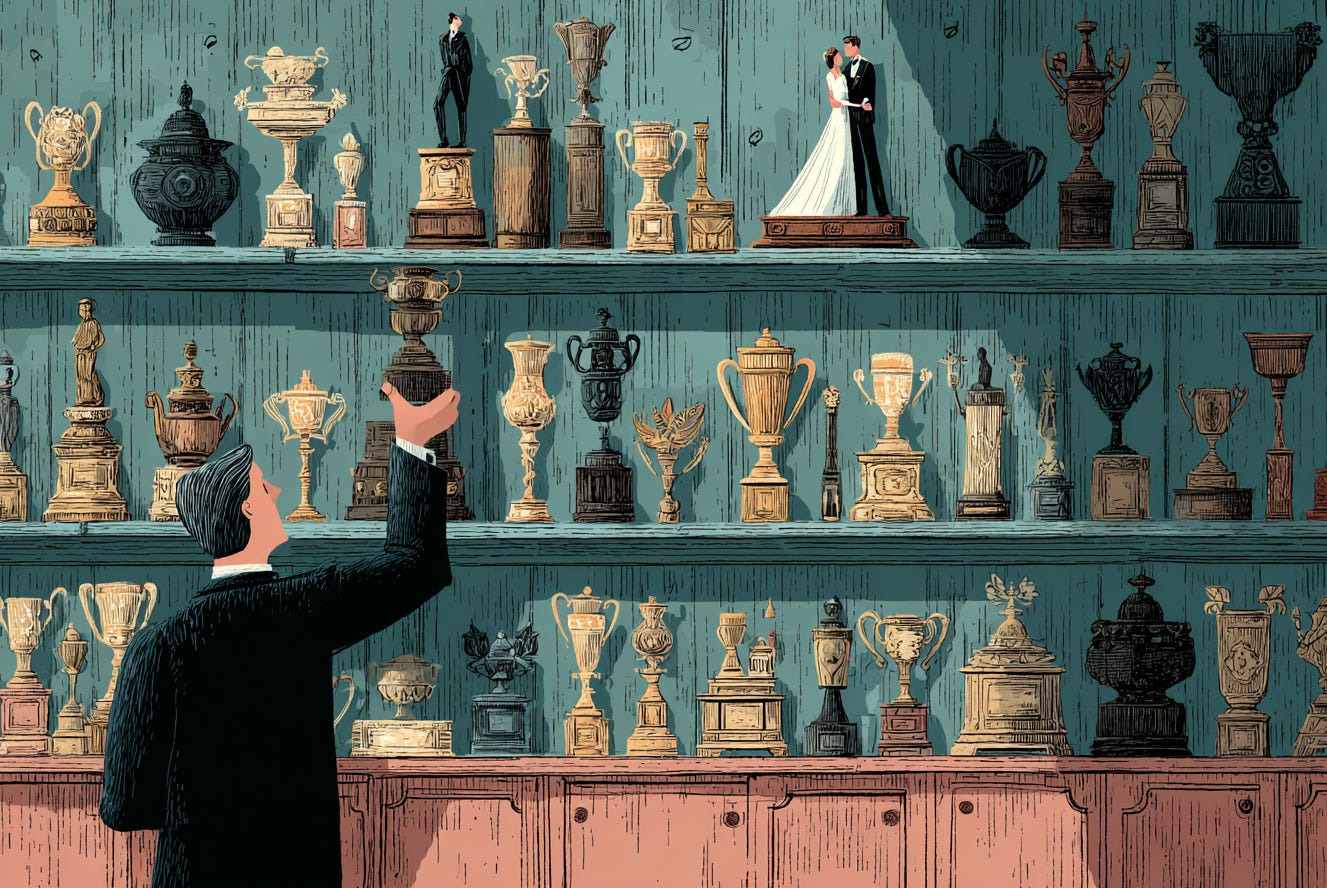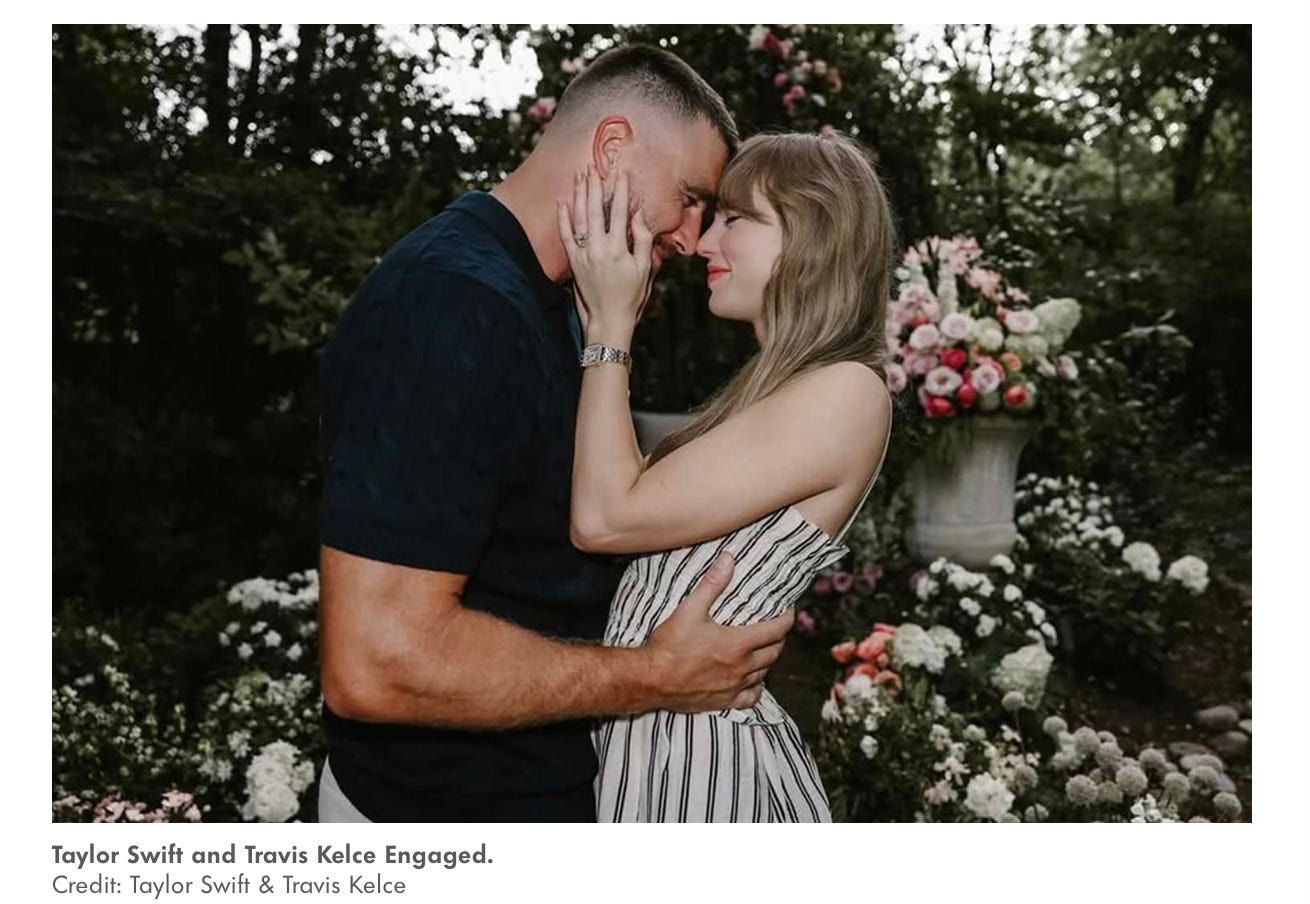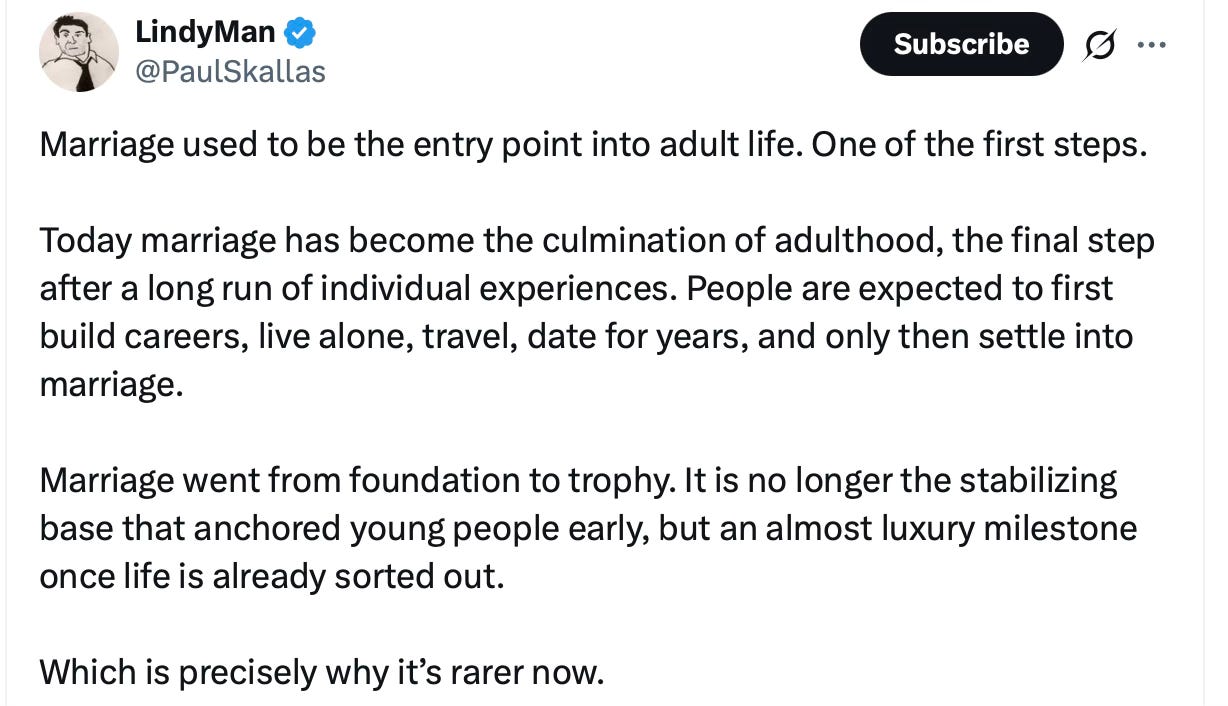The news landed like a royal announcement – Taylor Swift and Travis Kelce are getting married. Well, they’re engaged. The way I was taught, engagements were meant to be just long enough to organize a wedding day. Short and sweet, with the focus on starting a life together. Today, engagement is celebrated almost as it’s own life stage, a sign that you can handle a serious relationship. The notion that engagement is a sort of trial run before the “real thing” is odd when you think about it—why sign up for marriage if you’re not intending to marry? Then again, we have funny ideas about marriage these days.
People magazine called the engagement “a win for Millennials,” proof that dreams can come true. The dress she was wearing in her post sold out in 20 minutes. Many Swift fans are the same age as she is, and writer Emily Rella described how their lives have mirrored Swift’s, marked by heartbreak and “glimmers of hope” chronicled in her music. Swift’s fairytale romance feels personal to them, Rella wrote, because “we experienced all those milestones right alongside her… this moment of Taylor finding true, unadulterated, effortless love felt like something to celebrate, personally.” Her takeaway? Don’t settle. Hold out for a sweeping love story.
A lot has been said about Swift’s love life. Famous from a young age, it has been noted that her early songs held marriage as the ideal. But after a string of high-profile break ups, things have changed a bit. Swift said she feels her experience is similar to “many of her friends” who had a “very unique moment in life” around age 19 or 20 where you have “one foot in childhood, one foot in adulthood and you don’t quite know where to stand.” But whether her record shows she was “holding out” for The One or that she was just being swept along by cads who never took it seriously, she’s undeniably a grown-up now.
The idea of waiting ‘til all the planets are aligned to “settle” may not be all it’s cracked up to be. Setting aside the “significant risk factors” associated with teen marriages, the National Marriage Project says there is no evidence that getting married in your 30s or later has any advantage over those who marry younger. Yet, those who want to get married in their 20s are going against the cultural current that assumes that getting hitched is best left ‘til later.
Some years ago, John Hopkins sociologist, Andrew Cherlin proposed two competing views of marriage – the cornerstone vs the capstone. Cornerstone marriages (between ages 20-24), function as a foundation to build a life on. Today, as the National Marriage Project reports, cornerstone marriages have fallen on hard times in many places. The prevailing view is that “capstone” is better:
In this capstone approach, marriage for many is seen as a symbol that signals the achievements of two emerging adults who have reached a basic level of personal, psychological, and financial stability. Marriage is viewed as a crowning experience, the culmination of a lengthy transition to the adult world. Rather than anchoring a young adult life in a foundation of marital commitment and shared life-building with a spouse, emerging adults first set out to check off a set of tasks and personal achievements before entering the institution of marriage. Milestones such as finishing education, securing employment, and owning a home, which were primarily achieved during the early years of marriage in previous generations, are now seen as criteria for marriage readiness by many of today’s young adults and their parents.
Perhaps that is why so few young Americans have attained all “five marks of adulthood”–they’re yet to check the “get married” box.
Over on X, Paul Skallas summed it up like this:
Reactions to Skallas’ post show how people really see marriage: risky, expensive, unnecessary, even harmful. Men claimed to be discouraged by the prospect of divorce courts taking everything they have; the cost of dating, let alone weddings is not worth it. Over at MSNBC, Christina Wyman warned women that Swift is “about to find out what a lot of married women already know” which, according to her, is that “marriage creates more problems than it solves.” She goes on to assert that men benefit more from marriage and that single women are happier than those who are married. This isn’t true, but it’s telling: marriage is now perceived as a gamble at best, a patriarchal death sentence at worst—at least if you get your worldview from op-eds.
If this is what our culture has to say about marriage, no wonder young people put it off. It’s starting to feel like marriage has reverted to its pre-modern status: a luxury for the rich, who can afford both lavish weddings and the fallout of divorce if it all goes to vinegar. But Brad Wilcox at the Institute for Family Studies argues that marriage’s decline isn’t primarily economic. People stayed married through the Great Depression—when they were broke, hungry, and choking on dust storms—while the golden age of the 1990s saw a retreat from marriage. What changed wasn’t wealth but values: “The counterculture, sexual revolution, and rise of expressive individualism… undercut the norms, values, and virtues that sustain strong and stable marriages.” And while culture tells us to delay marriage until we’re “ready,” it is strangely silent about choices that actually raise divorce risk, “such as having multiple sexual partners before marriage and pre-engagement cohabitation”.
But celebrity engagements still grab so much attention. We roll our eyes at marriage– critics even fret that Swift will have nothing to write about now, warning that ”The fairytale ends when the princess marries the prince: who cares, really, what happens to her after that?” But a pop starlet’s ring announcement still stops traffic. Our culture has made marriage both the natural step after getting your life together and entirely unnecessary; it’s the pinnacle of adulthood but also a high-stakes game of chance. It is a most important quest, but we don’t know whether we even want the prize. Yet, despite these mixed messages, we still celebrate weddings because the longing to be fully known and deeply loved—so uniquely symbolized by marriage—remains a universal human desire.
There’s error in believing, as Rella hopes, that a wedding day magically ushers in “true, unadulterated, effortless love.” But it’s equally wrong to accept Wyman’s caricature of marriage as drudgery and irritation. God designed marriage not as another prize to collect over a curated life but as a covenant that forms you, sanctifies you, and anchors your family. It reflects, despite its human frailty, the love Christ has for His church and the perfect communion of the Trinity. Martin Luther likened the marriage union to Christ taking His Bride’s humanity onto Himself and bestowing His immortality upon her:
“For if Christ is a bridegroom, he must take upon himself the things which are his bride’s and bestow upon her the things that are his. If he gives her his body and very self, how shall he not give her all that is his? And if he takes the body of the bride, how shall he not take all that is hers?”
The call of faithful, lifelong marriage is higher than the world understands, as it downplays broken homes as just one of those things. It overlooks the gift that marriage is to humanity, mistaking it for just another trinket that thrills for a while before it is set aside. It misses the mystery in its pursuit of the fairytale. The world swings between Hallmark-level romanticism and open contempt for marriage, but Christians get to tell a better story.
You might also like:






